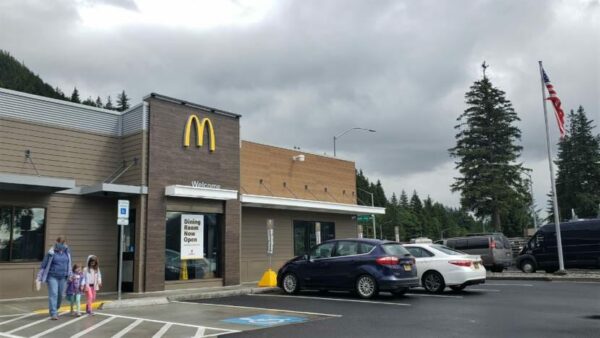
Alan Brown moved to Juneau recently from Nashville, Tenn., and he got a little sticker shock going through the drive-thru at McDonald’s when he ordered a McNugget meal. The total was $10.17.
“At home, it would’ve been like, $7 and change,” Brown said.
Brown isn’t an economist, but he did a thing economists like doing with McDonald’s menu — he compared the price of an identical product in two different markets.
The menu is also a handy way to track inflation in one place over time.
The Economist magazine has its Big Mac index. But for decades, state economists have gone with the quarter pounder with cheese, occasionally highlighting what it costs in different Alaska communities in the magazine Alaska Economic Trends. Spoiler alert for the July issue: It’s $5.49 in Juneau, up 10 cents from before the pandemic in 2019.
This issue of Trends focuses on spikes in the cost of living, and attributes a lot of that to supply chain problems related to the pandemic. There was deflation last year amid lockdowns, but now the world is reopening.
RELATED: Consumer prices spiked more than 6 percent in urban Alaska over the last year
McDonald’s wouldn’t answer questions for this story. But a local food truck business that specializes in burgers shared what’s driven its first price increases since opening in 2014. On social media last month, Pucker Wilson’s said its supply costs have more than doubled since January. So, the prices of most menu items went up by $1. Pucker Wilson’s cheeseburger is now $10.
Restaurants generally operate on thin profit margins, so they’re especially sensitive to changes in food prices. Plus, staffing is tough right now, and there are fewer customers around with a short cruise ship season.
“This is by far and away the hardest thing that we’ve ever had to deal with,” said Reecia Wilson, the main owner of five downtown Juneau restaurants, including Hangar on the Wharf.
Wilson said market conditions led her to leave two of her seasonal restaurants closed this summer and raise prices.
“It’s difficult to manage your day-to-day operations and just get through the day, let alone worrying about having to reprint your menus, and pay attention to the inflation as we lean into a very different business model,” she said.
Wilson said prices are up across the board, with meats and seafood especially. She hopes the supply chain problems are temporary and that she can rebuild her businesses.
Meilani Schijvens, who runs the economic publications firm Rain Coast Data in Juneau, summed up her take on what’s going on.
“I think that most people — most organizations — miscalculated how quickly once people got the vaccines, and once the vaccines were distributed — how quickly sort of normal life would return, and so, normal demand,” Schijvens said. “And so you just see a lag. And you see it locally, nationally, globally, in terms of getting the supply chains up to the level of the demands that we are now having.”
Burgers and menu prices are one indicator of supply chain issues. Schijvens highlighted another price-related indicator, measured by the millions.
“So we’re seeing a lack of building supplies. We see that locally with our building projects, our construction projects, have gotten really expensive, really fast,” she said.
The Alaska Department of Transportation and Public Facilities does a lot of construction, and Christopher Goins is the DOT construction engineer who estimates he’ll oversee more than $140 million in construction contracts for the Department across the region this season.
“We’re definitely seeing price fluctuations, a lot of prices going up, materials shortages in general, across the board,” Goins said.
The way competitive bidding on government contracts goes, construction companies working now likely locked in what they’d be paid months ago (or even years ago for multi-season projects) before materials prices went wild.
“Yeah, so (for) the most part, our state of Alaska contracts really don’t have what we call ‘escalation clauses,’” he said. “When a dollar amount comes in, it’s pretty much a fixed dollar amount for that contract.”
Goins said the department has been willing to give contractors extra time. But it’s on them to factor risk into their bids, which Goins is seeing for projects in the bidding stage now.
When bids come in higher than budgeted, there’s only a few options: Ask policymakers for more money, scale projects back to fit the budget or don’t build.
“So, that’s the harsh, hard realities of the budgeting process from our end,” Goins said.
It’s pretty much the same story with Goins’ counterpart at the City and Borough of Juneau.
Looking forward, Goins has hopes, but no certainty.
“I don’t think we’re through this inflationary blip, if it is a blip,” he said. “And hopefully, the markets, as the country gets back to producing and the world gets back to producing, we hope that some of those higher spikes will begin to fall.”
The industry group Associated General Contractors of America has said the materials and supply chain problems may put some firms out of business and add to the industry’s high unemployment rates.
Jeremy Hsieh is the deputy managing editor of the KTOO newsroom in Juneau. He’s a podcast fiend who’s worked in journalism since high school as a reporter, editor and television producer. He ran Gavel Alaska for 360 North from 2011 to 2016, and is big on experimenting with novel tools and mediums (including the occasional animated gif) to tell stories and demystify the news. Jeremy’s an East Coast transplant who moved to Juneau in 2008.





